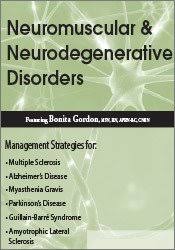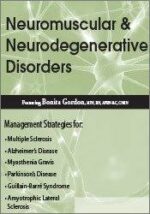Available for Pre-Order. This product will be available within a few days.
Bonita Gordon – Neuromuscular & Neurodegenerative Disorders
Description:
Management Strategies for:
Multiple Sclerosis
Alzheimer’s Disease
Myasthenia Gravis
Parkinson’s Disease
Guillain-Barré Syndrome
Amyotrophic Lateral Sclerosis
Neuromuscular & Neurodegenerative Disorders remain the nation’s leading cause of disability. They are devastating and costly. There is a need to provide early diagnosis and apply effective therapies for these disorders. Join expert, Bonita Gordon, MSN, RN, APRN-BC, CNRN, and gain new insights into the pathophysiologic changes, clinical manifestations, and diagnostic studies for each of these disorders. Learn the latest in innovative medications that are geared to slow or stop the disorder progression.
Through an engaging presentation style and enlightening case studies, Bonita will enhance your knowledge regarding current practice issues. The evidence-based content is valuable to all healthcare providers caring for patients with neuromuscular and neurodegenerative disorders.
Would you like to receive Bonita Gordon – Neuromuscular & Neurodegenerative Disorders ?
OUTLINE
Multiple Sclerosis
Four Classifications of MS
Look for the Oligoclonal Bands
ABCs of Medication Management
Immunomodulating disease-modifying agents
Corticosteroids
Antispasmotic
Anticholinergic
Antiviral
CNS stimulant
Antiepileptic
Antidepressant
Beta blocker
Natalizumab
Manage the Symptoms
Optic neuritis
Fatigue
Ataxia
Alzheimer’s Disease Diagnosis
Staging the Disease
Disease-Specific Treatment
Drug therapy to slow the progression
Treatment of behavioral manifestations
Provide a Therapeutic Environment
Participate in activities of daily living
Monitor and protect from injury
Community resources
Caregiver stress
Myasthenia Gravis
Neuromuscular Junction Disorder
Autoimmune process
Reduced acetyl-choline receptor sites
Doing the Edrophonium Test
Evaluate response to edrophonium (telsilon)
Short-acting anticholinesterase inhibitor
Increase neurotransmission
Pathways to Recovery
Medications – anticholinesterase inhibitors, corticosteroids, immunosppressive agents
Thymectomy
Plasmapheresis or intravenous immunoglobulin
Parkinson’s Disease
Degeneration of Substantia Nigra
Basal ganglia degeneration
Deficiency of dopamine
Know the Symptoms “T-R-A-P”
Tremors – resting
Rigidity – cogwheel jerking
Akinesia – bradykinesia
Posture – stooped, shuffling gait
Treatment Options
Medications – dopaminergics, anticholinergics, dopamine agonist, MAO-B inhibitor, COMT inhibitors, antiviral
Neuroprotective agents
Deep brain stimulation
Guillain-Barré Syndrome
Syndrome Variants
Ascending
Pure-motor
Descending
Miller-Fisher Syndrome
Treatment Options
Plasmapheresis
Intravenous immunoglobulin
Amyotrophic Lateral Sclerosis
Degeneration of Motor Neurons
Excitotoxic damage
Defect in transport proteins
Slow and Progressive Weakness
Muscle atrophy
Paralysis
Respiratory failure
Death
Symptom Management
Alternatives
Megadose vitamin
Pancreatic enzymes
Wheat germ
Snake venom
Bee pollen
OBJECTIVES
Explain the appropriate medication management in the care of the multiple sclerosis patient.
Compare the latest options to manage the various symptoms of the multiple sclerosis patient.
Illustrate how to provide a therapeutic environment for the Alzheimer’s disease patient.
Explain the latest drug therapy options available to slow down the progression of Alzheimer’s disease.
Diagram the pathways to recovery for the patient with myasthenia gravis.
Analyze treatment considerations for the patient with Parkinson’s disease.
Contrast the syndrome variants for the patient with Guillain-Barré Syndrome.
Develop symptomatic management for the patient with amyotrophic lateral sclerosis.








